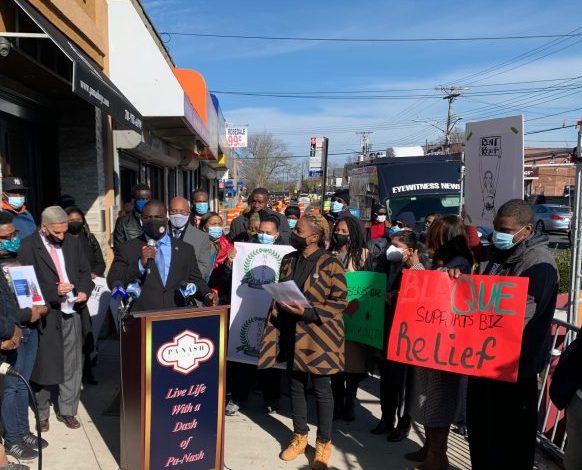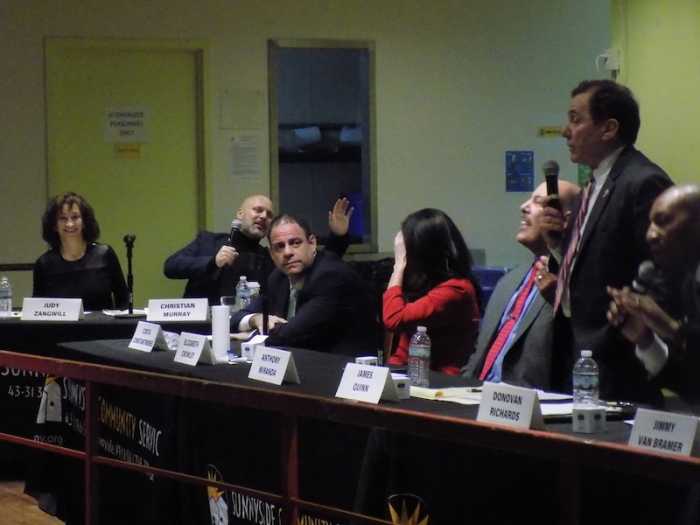Earlier this year, Ricardo Ricketts was hospitalized with COVID-19 and fighting for his life. His lungs collapsed and he suffered from a brain bleed. He lost vision in one eye. Now months later, out of the hospital but still on the mend, he’s fighting for the life of his business as the city faces a resurgence of the virus that nearly killed him.
“We have been hit by this COVID,” said Ricketts, the owner of GameStation in Hollis, weakly into a microphone at a press conference outside of the Pa Nash Eurosoul restaurant in Rosedale last week. “What we need is a swift and steady response.”
Ricketts is one of many small business owners looking for answers in the face of uncertainty as the second wave of the coronavirus pandemic approaches. The number of positive cases of COVID-19 in the city is steadily rising and as cases increase, the resulting restrictions loom. Public schools closed just last week after a confusing flurry of press conferences and tweets because the city surpassed the 3% positive test rate threshold, according to numbers released by the city.
Earlier this month, restaurants and bars were ordered to close at 10 p.m. And now as Mayor Bill de Blasio hesitates to close indoor dining and further restrict life in the city, preferring to have Governor Andrew Cuomo make that call, small business owners are left wondering if they will be the next to have to shut down or limit their hours. And, having barely scraped by during the first round of shut downs this past spring, they are wondering if they will more support this time around as they struggle to stay afloat.
“That’s the bottom line,” said Ricketts. “We don’t have the patrons to service our business but we’re required to pay our rent and to pay our obligations.”
Ricketts and other small business owners in Southeast Queens joined with business advocates, activists and lawmakers last Thursday to call for the city, state, and federal government to help small businesses scrambling to make ends meet during the coronavirus pandemic. They called for more support in the form of grants, loans, and training. Small businesses are struggling from the pandemic already, they said. If more restrictions are put in place, they have no chance of surviving without help.
“We are here to ask our representatives –– not ask. At this point we’re demanding. We really, you know, we can’t wait anymore,” said Jaime Faye Bean, the Found of Queens Together, a board member of the Western Small Business Council, one of the people behind the event. “We are begging not only for small businesses but the future of our neighborhoods.”
For black owned businesses in predominantly black neighborhoods like those in Southeast Queens, the need is even more dire because access to resources is even more scarce, said City Councilmember and Queens Borough President-elect Donovan Richards (D-Arverne, Brookville, Edgemere, Far Rockaway, Laurelton, Rosedale, Springfield Gardens).
“When you look at the common denominator access is the big question,” Richards said about the disproportionate effects that the pandemic and its economic fall out has had on black communities. Richards authored a bill that passed over the summer and was signed into law requiring NYC Small Business Services to report by geography and race where its loans are distributed throughout the city.
“It is not good enough to talk about racism without breaking down the economic issue, the economic injustices that our community has felt,” Richards said. “We don’t want a bail out for Wall Street. What we need is a bailout for Main Street and that Main Street must include Black and brown communities.”
Newly elected State Assemblymember Khaleel Anderson (D-Arverne, Brookville, Far Rockaway, Hammels, Rosedale, South Ozone Park, South Richmond Hill, Springfield Gardens and John F. Kennedy International Airport), who during his first week in office sponsored an Assembly bill that would suspend commercial rent payments for tenants affected by the pandemic, echoed Richards statement.
“I’m gonna say something that’s probably going to cost me a few votes but it’s true: When white American gets a cold, Black America gets the flu,” Anderson said. “In this moment when our small businesses are struggling, in this moment when our small businesses are not receiving the investment that they need, in this moment when the federal government has turned their backs on these small businesses that are the lifeblood of our community, we need to stand up and step up and make sure that our communities are at the forefront.”
The call to action in Rosedale was one of multiple taking place around the borough. The previous Friday, just hours before the state mandated 10 p.m. closure for restaurants and bars was set to start, lawmakers, advocates and small business owners in Western Queens gathered outside of Little Chef Little Cafe in Long Island City. They demanded that if more restrictions are to be set in place, the city, state and federal government take responsibility and make it possible for businesses to close but remain viable. On Tuesday this week, City Council candidate for District 29 David Aronov will be rallying with local small businesses outside of Queens Borough Hall demanding a plan of action to support small business
Annette Runcie, the Chairperson of the Merchant Association of Rosedale, Laurelton and Springfield Gardens and the owner of the restaurant Pa Nash Eurosoul in Rosedale, said that the PPP and EIDL loans that went out during the first shut down did not make it to Rosedale.
“Many of our small businesses in this community did not see that money,” Runcie said.
But now they need grants and technical support instead of loans, she said. The businesses can’t afford to pay back the money and shouldn’t have to pay interest on it. They also need help overcoming hurdles such as adjusting to new technology as they pivot to new revenue streams to stay afloat.
Michael Duncan, the owner of the restaurant Jamaica Breeze and The Roc grocery store, said that he wants a bailout for small businesses but that it should not start and stop there. The community needs to support itself too, he said. Residents need to shop locally.
“The bailout should be the icing on the cake. Not the cake. We need a bailout from us,” Duncan said. “We have to start living, loving, and shopping in our communities where we live.”








